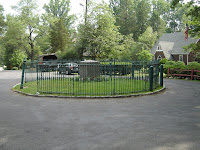Odysseus Trent
—Free Writing
I’ve never met a single other
kid—anywhere—who has my name.
Odysseus. I hate it. I mean, how would you like to have a name
that’s so weird that no one else in the whole school has it? Probably no one else in the whole
country! Once, just to see, I took the
entire Cleveland phone book, the big fat one, and started going through the
names, starting with the A’s, just to see if I could find some other person
with the name Odysseus. If I find one, I told myself, I’ll call him up and let him know that he’s
not the only loser in the world. There’s
another one, right here in Spoon River.
I got into the G’s before I got
bored. And guess what? No other Odysseus turned up. I wasn’t surprised, not at all. In fact, I was kind of relieved that no other
person—at least A through G in Cleveland, Ohio—has had to go through what I’ve
gone through in my thirteen years.
Most people can’t even pronounce
it. oh-DISS-oose
is the way it’s supposed to be, according to my dad, who insisted on giving me
that dumb name. The last syllable rhymes
with noose, which is what I feel like
putting around my neck. Or goose, which is what some of the big
kids call me: oh-DISS-goose, then
say, point at me, not DAT goose! They’re funny, aren’t they? Big guys?
Well, big guys don’t have to be funny, do they? They just have to be big. Because when you’re big, you can make
everyone else laugh at whatever you
think is funny.
Lots of kids around here have
good names—even weird kids. Look at
Billy Kidd. What a cool name. You’ve gotta admit it, Billy himself is a
little strange—with all that cowboy stuff he’s into—but he can’t complain about
his name. He’s got a great one. So does Candace Geist. Shorten Candace
and you get Candy. Pretty good name for a girl that’s into all
that supernatural stuff that she’s into.
(Geist, you know, is German
for ghost.) I mean, you couldn’t tell from her name that
there was anything wrong with her. She
and Billy at least have a chance,
with their names, once they get out in the real world and get normal, if they
ever do. But me? Odysseus
will be bad, now and always.
Odysseus, of course, is the name
of that Greek guy who took twenty years getting home from the Trojan War. Homer wrote a whole book about him, The Odyssey, which is the story of
Odysseus. The Roman name is better:
Ulysses. I wouldn’t mind being called
Ulysses, but my dad, who likes Homer and all that ancient junk, liked Odysseus. And so I’m Odysseus and, as you’ll find out
in a couple of years, my younger sister is Penelope. That was Odysseus’ wife. How would you like having a sister whose name
is the name of the wife of the guy who had your name? It’s sick.
But, you know my dad.
You do know him, don’t you, Mr.
Stratford? I know you’ve been here just
a year, but I know that you know him.
You teach 8th grade English. He
teaches 6th grade English. So I know
that you have meetings and stuff together.
He always says he’s not smart enough to teach older kids, but that’s a bunch of garbage. I know the real
reason: He’s even smaller than I am (in case you haven’t noticed), and he
doesn’t want to have to tell these big guys to sit down and shut up and do
their homework. Because they might just
turn around and say Make me,
little man, and then what would he do?
Well, he’d do the same thing I do when big guys tell me to do something:
Do it. Or run like hell. But Dad’s not much of a runner. So he teaches kids that are usually smaller.
Having your dad in the school as
a teacher is not that good an idea. Down
in sixth grade, when I had him as my teacher, it was even worse than it is
now. Kids would ask me what was going to
be on the test. And when I said I didn’t
know—which I didn’t—they would call me a liar.
And when I got a good grade on something, they said my dad helped me. And when I got a bad grade on something, they
would laugh and say he was such a bad teacher he couldn’t even teach his own
kid.
And the bigger guys? When Dad yelled at one of them, or punished
one of them, they would get me later, out in the hall, down in the locker
room. They’d punch me in the arms so
hard I sometimes couldn’t even take my shirt off at night because I couldn’t
raise my arms above my shoulders. Or
they’d shove me in the shower with my clothes on. Or while I was in the shower, they’d take my
clothes and throw them out in the hall, and I’d have to run out there with a
towel around my waist and hope I didn’t see any girls.
Of course there’s no good way to
make a short name out of mine. No Rich for Richard or Eddie for Edward.
What do you make out of Odysseus? Oddy? That’s not very good. But my dad never thought of that thirteen
years ago. Mom, either, I guess, because
she went along with it. When I’m a
parent—if that ever happens—I’m going to do two things: One, make sure I don’t
teach in a school where my kid goes.
Two, give the kid a name he can live with. Something simple that other kids can’t turn
into a weapon to use against him.
You don’t ever see real weapons
here in this school (you can relax about that,
Mr. Stratford). No, kids in this school
have something worse. Words.








